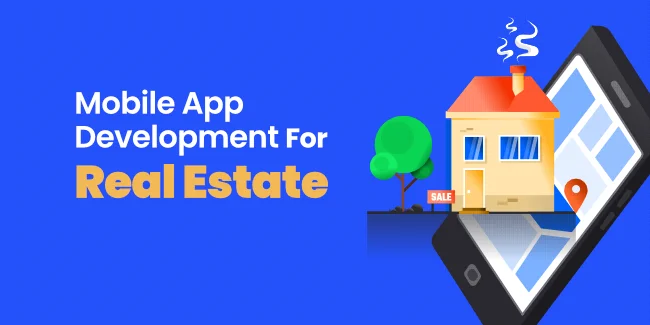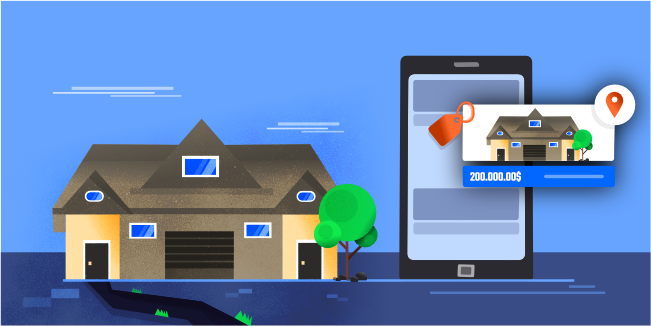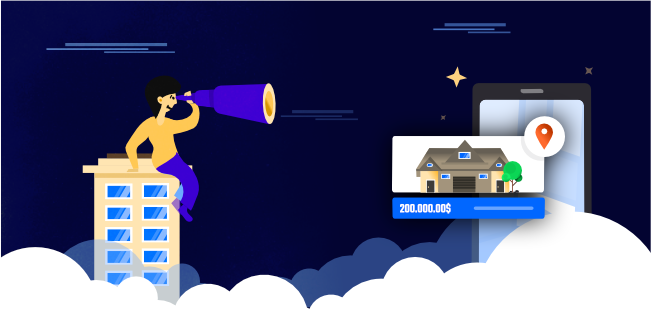Mobile Development
Business
trendsrealestatesoftware
real estate app development
realestateapps
Guide Through Mobile App Development For Real Estate

One in every four individuals utilizes a real estate mobile application to locate, buy, and sell houses online. Have you heard? Real estate has always been a prosperous business, but now with the rise of smartphones, it is more relevant than ever before.
More people are searching for properties online, making the real estate market more competitive than ever.
According to recent market reports, an overwhelming majority of real estate agencies - 95%- have websites with property listings.
A website is only a drop in the bucket compared to everything else you need for your real estate business if you want to stay ahead of the game. You'll need a custom mobile app too.
With nearly two million apps in the average app store, your real estate app is to the trend and must compel people to download and use it.
Why is it essential to have a mobile app for your real estate business? And what makes an "outstanding" real estate mobile app with features that make it stand apart from the rest? Let's explore these questions.
Types of Real Estate Apps

It's crucial to consider various types of potential services before you start constructing a real estate mobile app. Each type is slightly different from the others, so it is worth getting to know each separately. These types are:
- Home Valuation App
- Real Estate CRM Mobile App
- Property Management System Mobile App
- Real Estate ERP Mobile App
- Renting Mobile App
- Buying and Selling Real Estate Mobile App
Let's get to know them separately and find out what are the differences between them and what they are similar in.
Home Valuation App
Real estate mobile apps that value homes give users all the data they need to know about a home's worth.
An app like this allows property sellers to calculate the value of their housing so they know how much it is worth.
The accommodation cost is calculated using data about the home's location, size, state, and other additional information. The machine learning (ML) system employed in this process uses artificial intelligence (AI) to estimate a price.
Real Estate CRM Mobile App
The Real estate CRM, or Customer Relationship Management software, helps real estate agencies and real estate agents manage their business and relations with buyers or renters. Real estate CRMs are not only helpful but necessary when it comes to managing a sales pipeline, getting feedback from users, and responding to requests.
Property Management System Mobile App
Real Estate PMS apps, or property management systems, are a type of mobile app used for managing hotels, commercial buildings, and residential properties.
Applications like these fit accommodation managers and business or hotel owners needing help with daily tasks.
Real Estate ERP Mobile App
Real Estate ERP applications are software tools that help real estate companies' employees do their work, such as controlling accommodation rates or informing clients about new locations.
A Real Estate ERP mobile app can help manage information, collect data, receive performance updates, and use digital tools to communicate with external clients.
Renting Mobile App
Applications like this enable people to rent out different types of accommodation for either a short period (vacation, weekend, business trip) or long term.
A key focus for vacation rental services is describing amenities, pictures, locations, and neighborhoods.
Buying and Selling Real Estate Mobile App
The real estate mobile app is designed to streamline the home buying and selling processes. Unlike apps like Airbnb, which allow users to rent accommodation with just a few clicks, real estate apps aren't entirely automated.
A mobile app for buying and selling also has a human element, such as real estate or customer service agents who help buyers choose the perfect house. Plus, transactions are not usually carried out via mobile apps.
Why Perform Real Estate App Development?
A recent study found that an overwhelming majority of housing buyers- 73%, to be exact- use digital tools to search for a home. Even more impressive, 58% of those surveyed reported using only mobile devices to find their dream homes.
There are many reasons to develop a real estate mobile app if you wish to pursue business in the housing market. Listed below are some of the most common ones.
The real estate industry has adopted many new technologies, such as artificial intelligence and virtual and augmented reality. These technological advances can be helpful for:
- more precise accommodation value estimations
- chatbot mobile app development
- online leasing assistants
By providing a better user experience, our real estate app development will help visitors choose and buy their dream house or sell the one they have grown out of.
Better Viewing Experience
According to NAR (National Association of Realtors) research, 77% of real estate agents have found that it is easier to represent a house for a buyer when they can visualize the house.
If you're looking for a real estate app that includes 360-degree interactive VR real estate video tours, there are plenty of options for iOS and Android.
Higher Engagement and Conversion with User
According to the Real Estate in a Digital Age Report, more young people are finding their housing online, with 56% of those 36 or below and 50% of 37-51-year-olds.
According to the NAR Home Buyer and Seller Generational Trends Report, over 73% of customers use their smartphones to search for housing. It concludes that mobile apps can be just as effective in helping users find a home without using a computer.
It seems that real estate mobile applications are a promising solution for future development.
Trends in Real Estate Software Development

The real estate industry is constantly changing, and developers must change. This section will explore the three primary trends in real estate application development.
Artificial Intelligence
With artificial intelligence development, computers gain the ability to comprehend visual data, such as recognizing human faces or reading lips. Additionally, they can translate between languages and make decisions based on experience.
Artificial intelligence, working in unison with big data technologies, can analyze the preferences and requirements of real estate app users. This aids in giving people precisely, fast, and personalized suggestions about the accommodation they are looking for within apps.
In addition, artificial intelligence can be used for tasks such as management, tracking changes in listings, and price comparisons.
Augmented Reality
Augmented reality is an interactive experience in which computer-generated images are superimposed onto real-world objects.
Augmented reality in real estate mobile apps gives users a visualization of the property to help them see what it looks like in real life. Such an approach can assist app users when deciding about buying or renting.
Big Data
Data-processing application software wasn't created to handle large data sets. That's where big data comes in. Big data is used to find trends or patterns by analyzing massive amounts of information.
Big data development in real estate stores, processes, and gathers information about the users, which is then used to predict their future behavior and decisions. Perfect searching suggestions are created as a result.
How to Monetize Real Estate Mobile App?
There are many real estate apps, each with its monetization methods. In this paragraph, we will discuss the main ways to generate revenue from the two most popular types of real estate apps: buying/selling and renting apps.
If you are interested in finance in mobile app development, you may be interested in our article "Software development costs - everything you need to know + Free Estimation", in which we present the biggest challenges related to financing when creating mobile software.
Fees
Real estate application users may be asked to pay-per-use or subscription fees. For example, buyers can pay a commission after each property purchase, while agents can be asked to pay to feature them on the service.
Premium Features and Subscriptions
Advanced subscription plans, aka premium features, give users access to extended options, more listings, free consultations with real estate agents, and various other benefits that depend on the type of real estate app you're building.
For example, real estate agents who use premium packages become visible to a greater number of house hunters or regularly appear in property listings.
Advertising
Most of today's services rely on advertising to make money, and real estate mobile apps are no different.
For example, selling ads makes it possible to earn revenue from mortgage lenders, real estate agents, interior designers, and stores.
What Features Real Estate App Should Contain?

One of the most critical steps in creating a real estate mobile app is figuring out which features the future product will have.
Our experience and real estate market research have allowed us to identify several key features for mobile application development in this industry.
Let's investigate the features of the three most popular real estate apps: renting, buying, and selling.
Registration Ability
The registration feature allows users to sign up or log in. Depending on the app's purpose, the users may need to be registered before they can book, buy, or sell real estate.
A traditional registration calls for the user's name, email, and password. With this information alone, you can enter an app. That being said, any other pertinent details can be submitted under the user's profile page. Also, allowing users to log in with their social media accounts, e.g., Facebook, Google Twitter, is always nice.
The registration feature is available for all types of real estate mobile apps.
Profile Creation
Creating different user profiles for various roles is essential when developing a real estate mobile app. For example, buyers and real estate agents for rental and home purchase apps, buyers and brokers for realtor apps, renters for office rental apps, and so on.
Each user role will have access to its respective functions. For example, agents need to be able to view and manage their properties, appointments, schedules, and profiles of potential buyers. Similarly, buyers and renters should be able to save their favorite properties and use advanced search filters.
All good real estate mobile apps have personal profiles for their users as a security measure to make sure everyone is legitimate before allowing them to buy, rent, or sell the property.
Search Engine
Although finding the perfect property can be challenging, there are ways to make the experience more friendly, such as by including lots of advanced categories, services, and filters.
All real estate business apps have a search feature to let users find properties. However, the filtering of those results may vary based on the type of app used.
Furthermore, adding filters like the number of rooms and beds, home type, reviews, amenities and services available, dates of stay possible, and locations would be beneficial. By doing so, guests can easily find a perfect rental that matches all their specific needs and wants.
For other types of apps, special filters would need to be created. For example, home-buying and selling apps might use filters like home size, lot size, garage type, outside features, and community amenities.
Consequently, users can list their desired amenities and only view rental options that fit their needs.
About Property Pages
Real estate agents should have a page to share information about the properties they are selling, renting, or constructing.
In other words, posting pictures of the property, writing a description, adding pricing and availability information, and listing amenities and services should all be possible.
A core feature for real estate apps, such as renting, buying/selling, and home valuation apps, is the property page development.
Favorites Section
By including a wishlist feature in your real estate app, people can quickly and easily find their favorite properties again. It is crucial because it saves users time searching for accommodation.
The Favorites feature commonly seen in home valuation, renting, buying, and selling apps.
Callendar
The calendar function in a real estate mobile application benefits both property buyers and real estate agents. It allows users to select an appropriate date and time to schedule offline appointments, making the process more efficient.
Real estate mobile apps usually have a calendar feature that makes booking, buying, or selling properties easy. You can also use the calendar to set up meetings with agents or business clients or make appointments.
Maps
Not only do maps show buyers the location of the desired property, but they can also be used to help potential buyers decide whether to purchase said property. App maps allow you to add data about the neighborhood, infrastructure, transportation, stores, crime rates, and risks of natural disasters to give prospective buyers all relevant information.
Onboarding
Onboarding is the process of introducing your real estate app to new users. It helps these people learn about all the main features, and advantages your real estate app offers them.
After users finish onboarding, they can register and log in with social networks. If they don't want to commit, there's also an option to skip registration so they can explore the app first.
All types of real estate mobile applications have onboarding, but we will focus on the core features of real estate renting and buying/selling apps.
Real Estate App Development Costs

The cost of developing a real estate app depends on various factors, including the app's functionality and technologies. It also matters whether you work with a development agency or a real estate app developer.
The effectiveness of Proof also varies depending on what stage your product is currently in, such as the discovery stage, MVP development, or product scaling.
Discovery Phase
The Discovery Phase, a part of our Discovery Workshops studies, is the best way to start the development process, whether you are working with a real estate mobile app development company or using a website builder with a ready-made template.
Our real estate mobile app development services are always cost-efficient, and we recommend that our clients begin with the discovery phase for their products. In other words, the discovery phase is designed to identify how to correctly and effectively implement an idea.
The client will be given all the critical information required to commence product development through the discovery phase.
By taking this approach, you can lower the potential risks and create a development plan. It helps to quickly and cheaply implement the product idea.
MVP Development
We recommend that, after the discovery phase, you create a real estate mobile application MVP instead of immediately jumping into developing a fully-featured product.
The MVP, or minimum viable product, is the initial version of the item with only essential features. This prototype needs to have enough utility to be present in the marketplace.
Product Development
After developing and launching your real estate app, it's time to consider upgrades. Collecting feedback from users will help you understand what was missed and what features need some improvement.
Once you have a product generating stable income, you can begin to think about scaling your app.
Tips on Real Estate Mobile App Development
If you want to create a successful real estate app, you can't stop at just building it.
Creating a user-friendly app requires some thinking outside of the box. Luckily, we have some tips to help make your development process easier.
Improve Searching Functionality
If you want people to search for real estate on mobile apps, you need to give them a powerful search system that includes filters, sorting systems, and suggestions. It will make the user experience much smoother.
You will have much better results by including filters like location, year-built parking, and local specifics.
Provide Efficient Communication
People often have a lot of questions when they are looking for a property to buy. These questions might be about the features of the house or details related to booking it. So, there must be clear communication between buyers, real estate agents, and sellers.
A mobile chat or messaging system would be beneficial at this point, as it helps people contact a real estate agent and potentially book an appointment.
Use Graphic Elements
We could direct users' attention toward the app's key features by strategically incorporating graphic elements.
Mobile apps focusing on real estate should incorporate graphic elements to help the users navigate and find what they're looking for more easily.
Categorize all your data, then create a visual representation complete with icons and illustrations. This approach will help when you develop your real estate app, and it also makes a user-friendly design that people will love.
Final Thoughts
Any developer will tell you that creating a functional real estate mobile app is no easy feat- it's an entire system that has to be able to handle immense data and support thousands of users.
How can you create your real estate mobile app?
You must conduct discovery research to create an informative and innovative mobile application. Discovery research helps you understand your business competition and popular market trends. Moreover, by taking the time to discover your target audience, you can tailor your app specifically for them!
Second, create a budget-friendly MVP of your own real estate app that includes all the core mobile functionality. It will save you time and money by delivering your business to the market faster than competitors.
Before you begin to scale your mobile application frantically, double-check that you have all the necessary resources. Having these assets in place early on will be much simpler to expand later down the line.